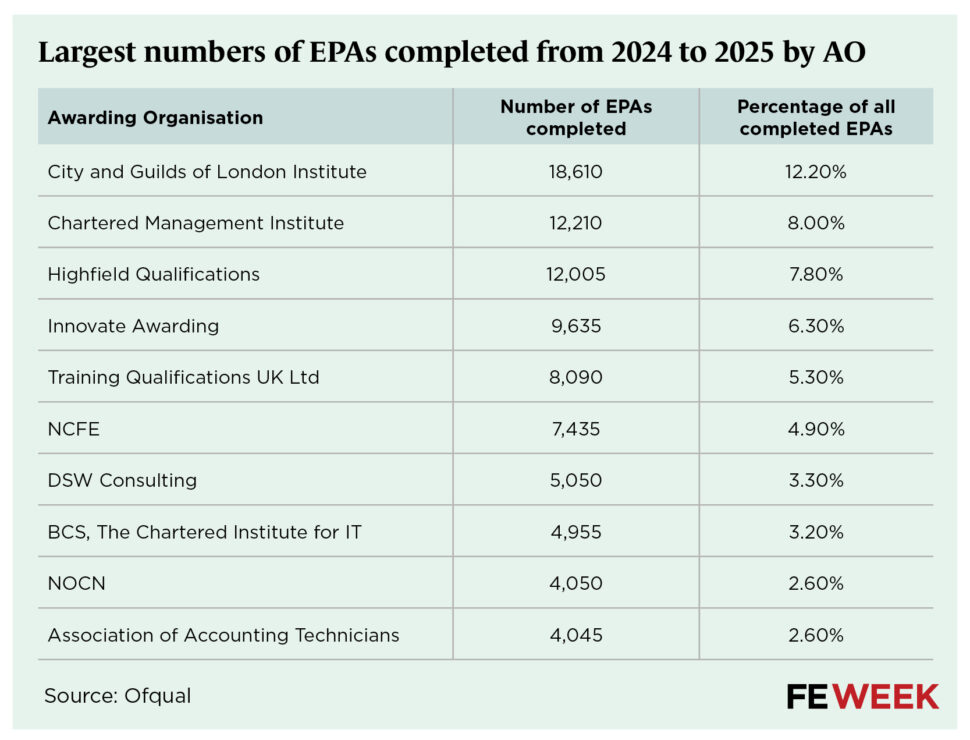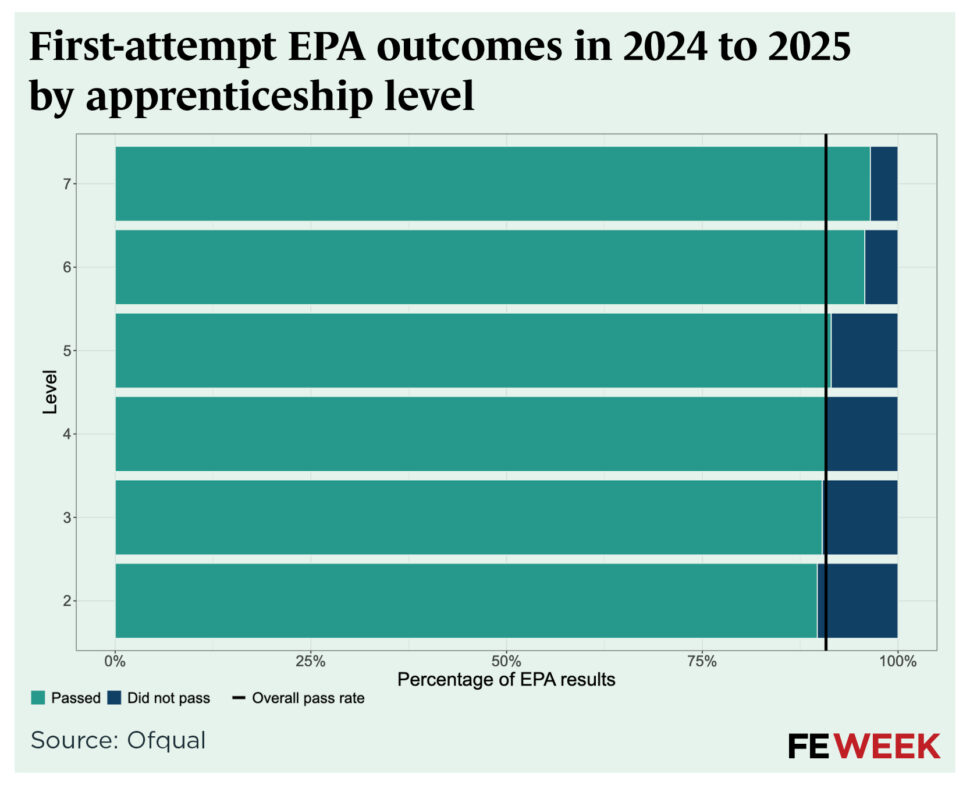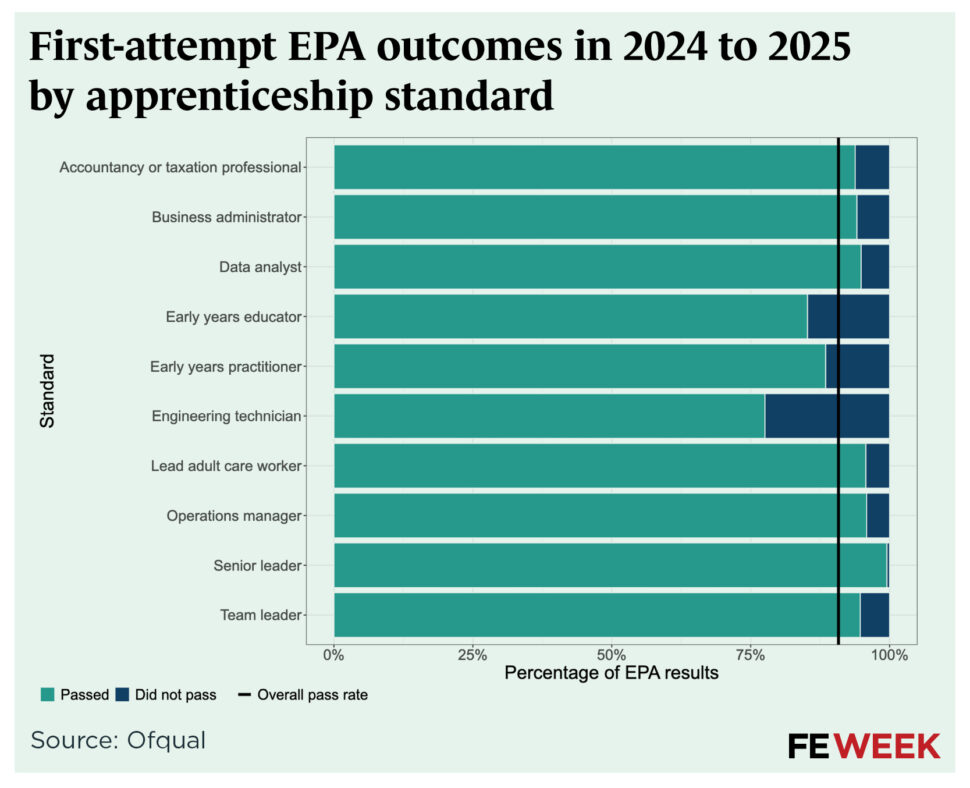Awarding giant Pearson has fallen out of the top 10 largest apprenticeship end-point assessment organisations after almost halving its number of EPA completions last year.
The finding was part of Ofqual’s annual round-up of EPA statistics, published today for the period March 2024 to February 2025.
It comes as the government pushes through controversial reforms that involve scrapping EPA and replacing it with a new streamlined version of assessment for apprentices.
Here’s what we learned from today’s Ofqual data.
City & Guilds dominates as Pearson falls off
City & Guilds of London Institute delivered the most Ofqual-regulated apprenticeship assessments for the third year running.
In 2024-25, 18,610 EPAs were completed by City & Guilds – 12.5 per cent of all in-scope assessments.
There were some moves in the top 10 most prolific EPAOs.
DSW Consulting and NOCN were new entries with 5,050 and 4,050 EPA completions respectively.
Meanwhile, Pearson Education Ltd and VTCT dropped out of the top 10.
Pearson dropped from 6,630 EPA completions in 2023-24 to 3,650 in 2024-25. VTCT’s total completions dropped slightly from 4,150 to 3,935 over the same period.
Ofqual’s data does not provide a breakdown of awarding bodies’ EPAs by standards or pass rates.

First-time pass rate returns to the 90s
Between March 2024 and February 2025, EPAs in 616 apprenticeship standards were in scope for Ofqual regulation. Out of the 157 awarding organisations recognised by Ofqual to offer EPAs, 139 AOs delivered EPAs across 491 apprenticeship standards.
A total of 153,155 EPAs were completed over this period.
Overall, the average first-time pass rate for Ofqual-regulated EPAs in 2024-25 across levels 2 to 7 was 90.8 per cent.
This was a slight rise from the 89.7 per cent first-time pass rate recorded in 2023-24. In 2022-23, the first year this data set was published, the first-time pass rate was 91 per cent.
There was a 6.8 percentage point difference between the highest and lowest first-time pass rates by level in 2024-25.
Assessments on level 2 standards, of which there were 38,480 last year, had a first-time pass rate of 89.7 per cent, whereas non-degree apprenticeships at level 7 had a first-time pass rate of 96.5 per cent from 9,615 completed EPAs.
First-time pass rates fall slightly as each level gets lower.
The vast majority (72,305) of in-scope EPAs were at level 3, which had a first-time pass rate of 90.3 per cent, followed by level 2 which had a first-time pass rate of 90.6 per cent.

Senior leaders most likely to pass first time
Apprentices on the level 7 senior leader standard had the highest first-time pass rate – 99.5 per cent of 4,050 completed EPAs were passed the first time.
This was followed by a 95.9 per cent first-time pass rate for the level 5 operations manager apprenticeship, and 95.7 per cent on the level 3 lead adult care worker apprenticeship.
Ofqual’s figures only list first-time pass rates for the 10 most popular apprenticeships.
Ranked ninth and tenth were the early years educator level 3 standard and the level 3 engineering technician with first-time pass rates of 85.2 per cent and 77.6 per cent respectively.

Business route is the most popular
Mirroring previous years, by far most EPAs were delivered in the business and administration subject route, taking up 22.7 per cent of all EPAs passed between March 2024 and February 2025, 34,780 in total.
Engineering and manufacturing was the next most popular apprenticeship route, with 15,600 regulated assessments, followed closely by education and early years, which had 15,035.
At the other end, the creative and design route had 765 completed EPAs, protective services had 3,115 and hair and beauty had 3,425.

